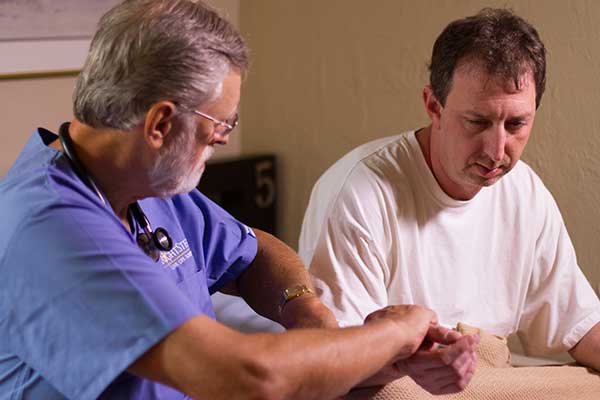Your loved one has just returned from rehab. Returning home after treatment is a significant transition, often filled with both hope and new challenges as your loved one adjusts to familiar surroundings. You’re excited to see them and proud of the hard work they’ve done to address their addiction. But your head is probably also filled with worry. You may fear their personality will be different or that they’ll somehow change you. If the individual coming home is your spouse, you may wonder if they’ve changed “too much” or if they’ve decided their life should head in a direction that doesn’t include you. Addiction takes a heavy toll on families. Trust is not a gift; it is something that must be earned, especially after being damaged by addiction. But with a fresh start at hand, there is hope for a brighter future with a sober loved one who can now be fully present in mind, body and spirit. Let’s take a look at some post-rehab fears and how things might actually play out.
Introduction: Understanding Family Fears When a Loved One Comes Home
When a family member returns home from rehab, it’s completely normal for family members to experience a whirlwind of emotions—fear, hope, anxiety, and even relief. The recovery process is a journey not just for the loved one, but for the entire family. Many families worry about the possibility of relapse, the impact of substance use disorder on daily life, and how relationships might change now that their loved one is sober. These fears and challenges can feel overwhelming, but addressing them openly is a crucial step toward healing. By embracing open communication and considering family therapy, families can work together to support their loved one’s recovery and create a positive, nurturing environment. Recognizing and validating these emotions allows everyone to move forward with greater understanding, patience, and hope as the loved one returns home and the family begins a new chapter in the recovery process.
#1 They’ll Come Home a Different Person
If the addiction was always part of the relationship, you may have to, in a sense, get to know someone you’ve never met. It’s scary because you don’t know if either of you will decide you are ultimately compatible. During this transition, it is important for each partner to support one another and work together to rebuild trust and understanding. Celebrating milestones together can strengthen a couple’s bond in recovery, providing moments of joy and shared accomplishment. But the good news is that you will now be dealing with the real person, not someone who is covering up their pain with drugs. It’s also unfortunately true that some people form new relationships while they’re in treatment. Because no one working on themselves in rehab has the bandwidth to emotionally engage in a new relationship, treatment centers highly discourage, even outright forbid, these “rehab romances.” If your spouse comes home wanting a separation or divorce due to becoming infatuated with someone they met in rehab, they likely didn’t take treatment seriously and you may not be ready to welcome them back into your life anyway.
#2 They’ll Change Your Life
When a loved one returns from drug rehab, the first rule for family members is to remove any alcohol or other addictive drugs from the house. It’s also important to hide or remove prescription pill containers as even the sight of them can be a trigger for use. Avoiding drinking in the home is crucial, as drinking can be a significant trigger for relapse during recovery. Common relapse triggers include stress, certain social settings, negative emotions, and exposure to drinking or drug use. But you may be concerned that your loved one will make you feel uncomfortable about your own alcohol use when meeting up with friends outside the house. You may also resent them for the fact that you can’t just grab a beer from the refrigerator when you get home after a long day at work. If you’re feeling this way, it may be time to come to terms with your own substance use. You and your significant other will both benefit from finding new ways to have fun without the use of alcohol or other drugs. This is how addiction recovery can affect families in a very positive way. If you are considering leaving an alcoholic spouse, there are resources available to help you make the best decision for your well-being.
#3 They Won’t Be Dependent on You Anymore
One of the most significant—and sometimes unsettling—changes after a loved one returns home from rehab is the shift in dependency. During active addiction, family members often take on the role of caretaker, managing daily responsibilities and providing constant support. As your loved one progresses in their recovery, they begin to reclaim responsibility for their own well-being, making decisions and managing their life more independently. Rebuilding trust after addiction is a slow and deliberate process that requires consistency and transparency. This transition can be challenging for family members who may feel uncertain about their new role or even experience a sense of loss. However, it’s important to recognize that this change is a positive sign of growth and healing. By focusing on establishing healthy boundaries and supporting your loved one’s autonomy, you help lay the foundation for a healthier relationship and a more sustainable recovery. Embracing this new dynamic allows both you and your loved one to grow, heal, and move forward together in a more balanced and supportive way.
#3 They Won’t Be Dependent on You Anymore
That’s what you are aiming for, of course, that they’ll learn to help themselves and stand on their own two feet. But it can be scary to think what might have been the main glue in the relationship — their need for your money, time, energy, shelter — has vanished. Helping others can become addictive in itself. This is a good time to deal with your fears and how they may subtly be holding your loved one back from a full recovery. Both you and your loved one may struggle with these changes, and seeking support can make a significant difference.
#4 This Will All Be for Nothing
The biggest fear people have when a family member comes home from rehab is that they’ll relapse. While rehab is not a cure, your loved one has learned a lot about themselves in therapy and will return to the family with new, healthy coping tools to deal with stress and cravings. Learning how to cope with triggers and challenges is essential for maintaining recovery and preventing relapse. Recovery has to be seen as a series of steps toward a goal. Relapse is not only possible, but likely. According to the National Institute on Drug Abuse, 40% to 60% of addicts will relapse at least once, and for opioid addicts, that number is even higher. It is important for families to set realistic expectations about the recovery process and understand that relapse can be part of the journey. And sometimes it takes that relapse to really bring home to a person that they do need help, that they can’t do it alone. And that can be the best lesson they learn.
#5 They’ll Resent You for Pushing Them to Get Help
You might fear your loved one will have hard feelings toward you when they return from rehab. Maybe you were the one who cut off funding, set up the intervention or insisted that they leave the house when they were in active addiction. In reality, far from being angry at you, once in recovery your loved one is much more likely to thank you for the actions you took that convinced them to get help. Almost every recovery story includes a time when family and friends told a loved one that enough was enough and stopped all behaviors that could be seen as enabling their drug use. For example, a parent might refuse to provide financial support, which at first causes tension, but later the loved one expresses gratitude for this tough decision that helped them seek treatment. Although you may start out as the “bad guy,” your loved one is likely to come to view you as the one who saved their life. During this process, it’s not uncommon to encounter challenges when making amends and trying to repair relationships.
Addressing Mental Health Challenges Together
Mental health is often deeply intertwined with substance use, and addressing these challenges is essential for lasting recovery. When a loved one comes home from rehab, family members may notice signs of depression, anxiety, or lingering trauma. Rather than facing these issues alone, families can come together to support their loved one’s mental health and overall well-being. Engaging in family therapy can help everyone better understand the mental health challenges at play and develop effective coping strategies. Encouraging self care—like regular exercise, mindfulness practices, or creative outlets—can make a significant difference in the recovery journey. If mental health concerns persist, seeking professional help is a vital step. By addressing these challenges as a team, families create a supportive environment that nurtures healing and helps their loved one continue working toward a healthier, more fulfilling life.
The Power of Family Therapy and Open Communication
Family therapy is a powerful tool in the recovery process, offering a safe space for families to address challenges, emotions, and concerns together. Through family therapy, loved ones can learn to communicate more openly and effectively, express their feelings, and work through unresolved issues in a healthy way. Open communication is key—it allows everyone to share their needs and worries without fear of judgment, helping to rebuild trust and strengthen relationships. By engaging in family therapy and practicing open communication, families can develop healthier coping strategies, address negative emotions, and create a supportive environment that fosters recovery and growth. This collaborative approach not only benefits the loved one in recovery but also helps the entire family heal and move forward together.
Creating a Supportive Home Environment
A supportive home environment is essential for a loved one’s recovery after rehab. Family members can help by removing substances and potential triggers from the home, establishing a consistent daily routine, and encouraging healthy habits like balanced eating and regular exercise. Homes should be made calming and stress-free to support the recovery effort of a loved one. Attending support groups, such as Al-Anon, can provide valuable guidance and connection for families navigating this challenging period. Practicing self care is equally important—managing your own stress and emotions ensures you can offer the best support possible. Setting healthy boundaries and clear expectations, such as avoiding social settings where substances are present, helps protect your loved one’s recovery and promotes overall well-being. Encouraging participation in therapy sessions and support group meetings further strengthens the recovery process. By working together to create a safe, nurturing environment, families can help their loved one stay on track and foster positive change for everyone involved.






